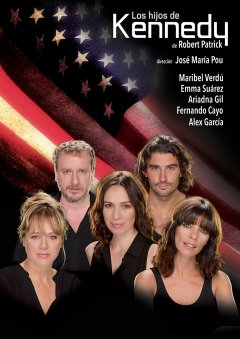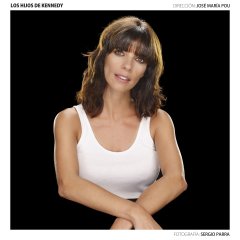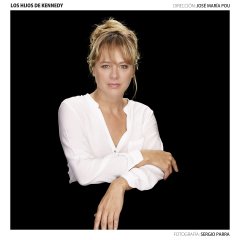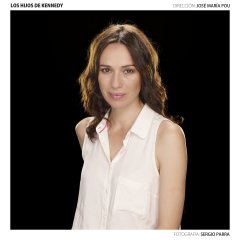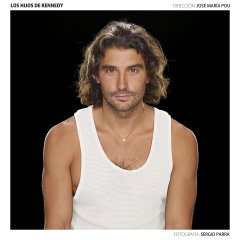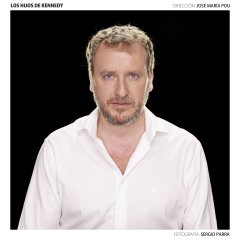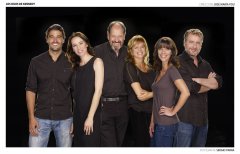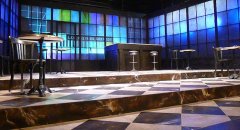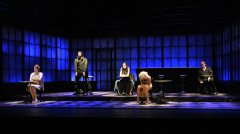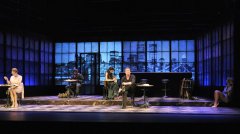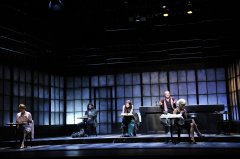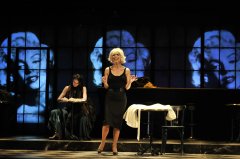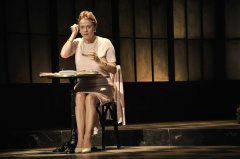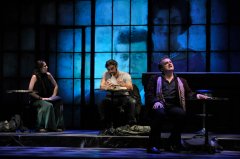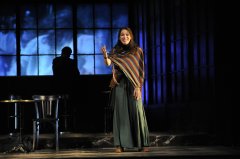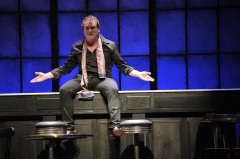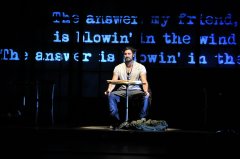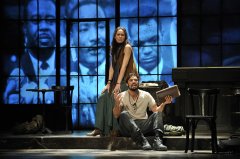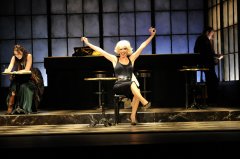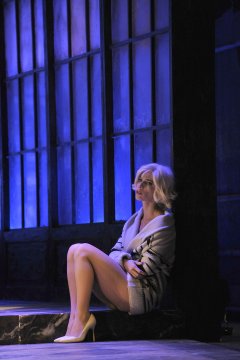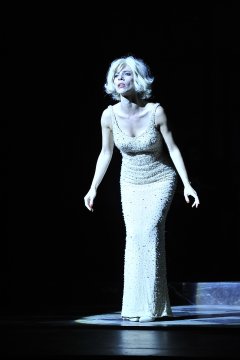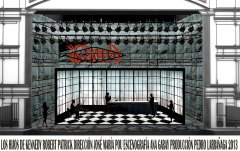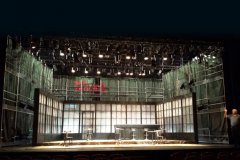Teatre
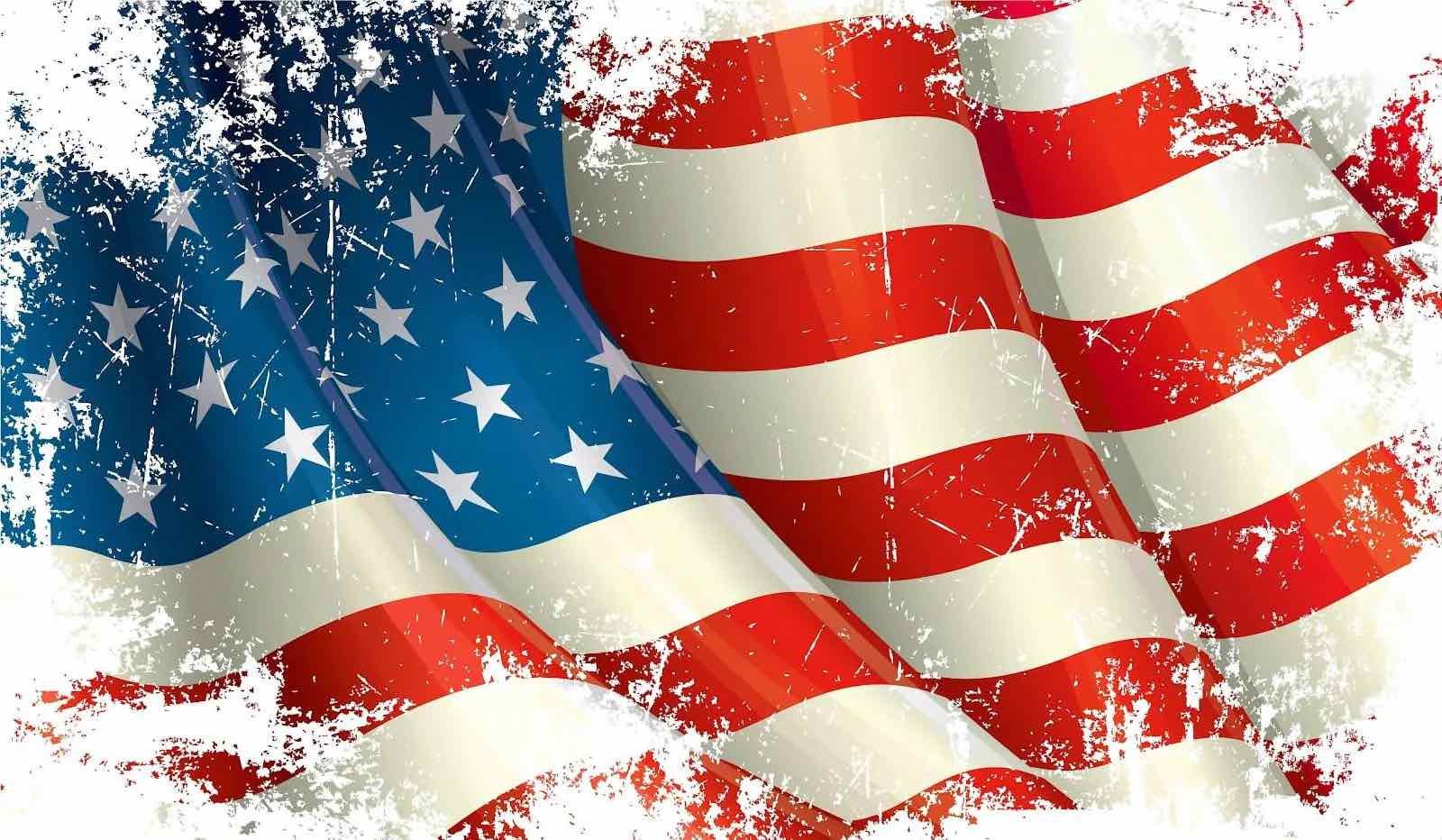
LOS HIJOS DE KENNEDY
- Títol original:
- Kennedy's Children
- Autor:
- Robert Patrick
- Director:
- Josep Maria Pou
- Estrena:
El 26 de setembre de 2013 al Teatre Arriaga de Bilbao.
El 10 d'octubre de 2013 al Teatre Alcázar-Cofidis de Madrid.
Sobre l'espectacle
- Producció:
- Trasgo Producciones y Focus
- Ajudant Direcció:
- José Luis Massó
- Traducció:
- Josep Maria Pou
- Adaptació:
- Josep Maria Pou
- Escenografia:
- Ana Garay
- Vestuari:
- Ana Garay
- Iluminació:
- Juanjo Llorens
- Caracterització:
- María García, Amparo Sánchez.
- So:
- Isabel Montero (Espacio sonoro)
- Intèrprets:
Emma Suárez (Wanda)
Fernando Cayo (Sparger)
Ariadna Gil (Rona)
Alex García (Mark)
Maribel Verdú (Carla)- Gira:
- Seis meses de gira por toda España.
- Premis:
2.014.Fernando Cayo, Premio "Meliá Recoletos" de la Asociación de Amigos del Teatro de Valladolid. (Mejor Interpretación Masculina)
Sobre l'obra
Cinc persones en un bar.
O 5 persones soles, una a una, en cinc bars diferents.
Cinc fills del seu temps.
Cinc "fills" de l'era Kennedy.
I els cinc vivint -revivint-, a cop de record i glop llarg, el que ha estat i no ha estat de les seves vides i del temps que els va tocar viure.
¿Qualsevol temps passat va ser millor?
Els cinc, des de l'escenari, paren una mà a l'espectador i el conviden a un viatge en el temps: la dècada dels 60 (del segle ja passat), quan tot estava per fer i tot era possible.
La dècada dels joves, dels drets de la dona, del poder Negre, el moviment gai i la contracultura; la de la guerra de Vietnam, els míssils nuclears i el bloqueig de Cuba; la del moviment hippie, el mur de Berlín, el maig francès, la píndola anticonceptiva i el "Fes l'amor, no la guerra".
La dècada de la bohèmia i la dissidència.
La dècada de l'amor lliure, la psicodèlia i el pacifisme a ritme de marihuana.
La dècada musical per excel·lència. La dècada dels Beatles, la de Janis Joplin i Jimi Hendrix, la de Bob Dylan i Joan Baez, la de Woodstock 69, "Hair" i "All you need is love".
La dècada de Martin Luther King, el Che Guevara, Neil Armstrong i Marilyn Monroe.
La decada John F. Kennedy.
De l'assassinat de John F. Kennedy.
Un 22 de novembre de 1.963.
Ara fa 50 anys.
Avui el món és un altre.
I nosaltres, els de llavors, ja no som els mateixos.
O sí?

Sobre l'autor
Robert Patrick EEUU, 1.937
Robert Patrick és autor de teatre i homosexual. És també poeta, lletrista de cançons, escriptor de contes i novel·lista.
De família treballadora, els seus pares es mudaven molt sovint a la recerca de treball, pel que mai va anar a l'escola de manera continuada. Les úniques constants culturals en la seva vida eren els llibres, les pel·lícules i la ràdio. Va conèixer el teatre, de manera esporàdica, en alguna escola, i es va enamorar definitivament dels escenaris mentre treballava de rentaplats en el teatre de Kennebunkport (Maine).
En un dels seus primers viatges a Nova York, a 1.961, descobreix casualment el Caffe Cino, el primer teatre underground de l'Off Off-Broadway i es queda allà, treballant de manera gratuïta a qualsevol comesa, mentre observa i participa en la producció de dotzenes d'obres de teatre. Després d'haver escrit una mica de poesia, el 1964 escriu la seva primera obra de teatre, "The Haunted Host". Va ser un èxit. A partir de llavors la dramatúrgia es converteix en la seva activitat principal i avui és autor de més de 60 obres estrenades i publicades.
Durant la dècada de 1960, Patrick va ser un autèntic pioner en el teatre Off-Off-Broadway i el moviment de teatre gai, amb més de 300 produccions de les seves obres durant aquesta dècada, només a la ciutat de Nova York. El 1972, Samuel French, editorial de textos teatrals i gestora de drets de representació, va qualificar Robert Patrick com el "dramaturg més representat a Nova York".
El 1973, Kennedy 's Children de Patrick es va estrenar de manera modesta i gairebé anònima a la rebotiga d'un pub de Londres. L'èxit la va portar al West End i immediatament es van fer noves produccions per tot el món. En 1.975 es va estrenar a Madrid. Patrick va viatjar molt, des d'Anchorage a Ciutat del Cap, per veure els diferents muntatges de l'obra.
Hola, Bob, un relat de les experiències obtingudes pel propi Patrick amb la producció de Kennedy 's Children va ser l'última obra que ell va dirigir abans de deixar la ciutat de Nova York.
Robert Patrick ha escrit també guions per a cinema i televisió, i ha aparegut en els documentals, Resident Alien (1990) (amb Quentin Crisp) i Wrangler: Anatomy of an Icon (2008).
Recentment, ha escrit i publicat les seves memòries, Film Moi or Narcissus in the Dark.
Es va retirar el 1990, i viu a Los Angeles des de 1993.
Talking with Kennedy's Children playwright Robert Patrick
Posted in Unscripted blog by John Beer on Nov 8, 2010 at 1:51pm
New York's Caffe Cino launched a theatrical revolution in the early '60s when it gave birth to the Off-Off Broadway movement. One of its resident playwrights was the prolific Robert Patrick. His play Kennedy's Children, which examines the legacy of the '60s in a series of interlinked monologues, became a smash hit in its mid-'70s London run. Promethean Theatre Ensemble is currently reviving the play in Chicago. I spoke to Patrick by phone at his Los Angeles home on November 1, the day before Election Day.
Let's start by talking about how Kennedy's Children has fared in Chicago.
The show was first done in Chicago with Shelley Winters's company [at the Studebaker Theatre in 1976; the production also featured Farley Granger] and she told the cast that they could improvise and it was a nightmare. It pretty much wrecked my reputation. I had been working for a year with a company called At the Drama Shelter. I had built a pretty good reputation in Chicago and Shelley Winters ruined it. Besides ruining my American career, if I had one, she ruined it.
Did you know that she was planning to improvise?
I found out about it opening night. And I threatened to sue the producer who had allowed it. He threatened to sue Shelley. And Shelley skipped the country. I'm not kidding. It was a fiasco, it was fun. But that's enough of that.
Come to think of it, I haven't had great luck in Chicago. A fellow did a recent play of mine in Chicago a couple of years ago, and the reviews were bizarre. I finally found out why when he finally gave in and sent me a DVD of the show. He had done the first act as a staged reading, the second act on TV, and only in the third act did the actors come on and act the play. And when I chastised him for this, he said, "But we didn't change a word."
As I understand it, you've retired from playwriting?
I left theater in 1990. Frankly, I was killing myself, doing play after play after play after play. I sometimes had three or four going at once in New York. After a while, because I was so poor, the only way I had a home was to sleep in the lighting booth of whatever theater was doing my plays. I was the most produced playwright in New York and I was sleeping in the lighting booth. (It must be really early in the morning for me to be telling you all this.)
Finally, in October of 1990, I was carrying a sofa on my back to LaMama for a show, and it started raining. The sofa got wet and it got heavier and heavier. I was practically on all fours by the time I got into the theater. I just lay down on the stage with the sofa on top of me, and an actress named Carol Nelson came in to rehearse. She lifted the sofa so I could get out and gave me coffee, and said, "Bob, I've been meaning to ask you for years. I do this because it keeps me from feeling like just an office worker, and I get to wear pretty clothes, and people applaud me. Why do you do it?" And for the first time I had no answer. That was my last show in New York. I left New York, because why be there if I wasn't doing theater?
Do you miss it?
I was already missing the New York that I grew up in. Off-Off Broadway, which to me was New York, had changed a great deal. My New York was gone, and I left, I came out here and got a job reviewing pornographic movies, which is what I do for a living now. Right now I'm trying to choose whether to review next one called Kennel Master or one called Torrid Twinks. I usually resort to alphabetic order to decide. I can't imagine that you're going to use this.
What changed about Off-Off Broadway?
Off-Off Broadway was done in places that made their living in other ways: churches, coffeehouses, art galleries, bars-and so they didn't have to charge admission; in fact they couldn't charge admission. And therefore they didn't have to do popular work. And so for the first time in history theater moved into the modern era, like when the Impressionists started painting as they wanted to in Paris. It was the greatest time in the world to be in theater. It produced great playwrights-Lanford Wilson, Sam Shepard, John Guare, Tom Eyen who did Dreamgirls, and on and on.
Then basically grants came in and it attracted a whole new breed of people who were in it for the money. I no longer recognized it. We attracted people who were out for careers. That's why I worked with At the Drama Shelter; they were wonderful people who had the original spirit.
You know, all small theaters like the Promethean, whether they know it or not, spring from the loins of Joe Cino who gave us the floor of his café to do whatever we had to do on it, and created the very idea of theater as an art form. The Promethean and thousands of theaters around the world owe their existence to him. Sam Shepard, by the way, will be in town this week to accept an award from the Chicago Tribune.
If you meet Sam Shepard while he's there, will you please tell him to call me?! I keep a 74-page archive of pictures from the Caffe Cino online, and Sam did a play at the Cino and was very much around there. He has become such a great big movie star now that he's impossible to reach. So slap Sam's hand for me and tell him, Call Bob; he wants you to say something about the Cino. Will you do that for me? And also Bernadette Peters and Al Pacino if they come through. I'm afraid they've all become veddy veddy big movie stars. And once they were not.
What inspired Kennedy's Children?
In 1973, I went into a bar called Phebe's, which was called the Sardi's of Off-Off Broadway.
It's still in the East Village now.
Yes, but now it's a sports bar with TV sets all over it. I went in to put up a poster for a show in the afternoon. And after I put up the poster, I looked around and, it was not very inhabited in the afternoon, but there were three or four people that I knew there and they were each sitting distant and apart from each other. And I went over to say hi to them, and to my astonishment got rather curt hellos and they went back to their drinks.
Now it was not our habit to hang around in bars in the afternoon. These were people who had been as energetic, as creative, as dedicated to the theater as I was. So I sat down and had a coke and watched them and I realized, they are having internal monologues, but they're having them each separately. My heart went out to them, but that very selfish part of the dramatist's heart was obviously working and saying there's a play in this somewhere. Then the bartender picked up the remote for a TV on the wall (that was also new, there had never been TV in Phebe's) and started clicking around. The sound was off, but he was just clicking from channel to channel. And there was a lion eating a gazelle, and then click! a shiny new car and then click! a commercial for toothpaste and click! some people rioting over something and click! a sitcom mother lecturing a child; and it hit me: That's the play. We will just go-we'll be part of one interior monologue and with no pause we click to another and then to another, and then to third, then to the second, then to the fifth, and then back to the first-and that was the play.
It had a pretty dramatic success in London.
An actor who had optioned it kept trying to get someone to do the play and no one would. Finally I got a call from him saying that the play was going to open in a bar in London, and would I come. So I called At the Drama Shelter in Chicago, which I had heard was doing my plays. I was going to threaten to sue them if they didn't give me any money. And they said, Oh, where are you? We have thousands of dollars piled up for you. And they flew me first to Chicago and then to London, where I slept in the storeroom of the theater where they stored coal and potatoes. The people who ran the theater said they didn't expect anything from the play, but they were bankrupt and about to close and they might as well close with a play they liked. Well, the day after opening night I signed contracts for the play to be translated into sixty languages. And I was a mad success d'estime in London and on the Continent and in Africa, in Brazil and Venezuela. Alas, the play was a great big flop on Broadway.
Why was that, do you think?
The acoustics in the New York theater were so bad that all the staging had to be dropped and the actors just came down center stage and yelled their monologues. What's more, Grease was playing next door and all the choral numbers leaked through. But it's also true that the London critics had chastised the New York critics for having missed me, and it may be that something happened. It may just be playwright's paranoia, but there seemed to be some kind of fix in. However, the play has been tremendously successful since then, and I think this is the fifth or sixth production in Chicago.
Thirty-five years later, how do you think Kennedy's Children speaks to our current situation?
That is a very good question. How is the past ever relevant? The people in the play are presented as artistically, as attractively as I know how to make them. With language, dramatic structure, humor and pathos, but my point is always the people, and I can't see that there is any dating people. I feel that this Republican resurgence, what they call the Tea Party, has nothing to do with politics. It has to do with people who are terribly frightened, because they elected people who damaged the country, perhaps irreparably. And they are feeling stupid and evil. The Tea Party tells them, "You are not stupid and evil," and they rush to it. The political content is utterly irrelevant. The personal, emotional content is why we are very likely to start putting tyrants and fools and thieves back in office tomorrow. So in that sense there's no dating anything; it's all about people. They're all Oedipuses asking oracles "What should I do? How can I be moral? How can I feel good about myself?" Oedipus had to put his eyes out and these people, in order to feel good about themselves, may very well put an end to the Western stage of civilization.
Galeria fotogràfica
© David Ruano
Crítiques
- Els fills de Kennedy, de Marilyn I de Joplin... . NACIÓ GRANOLLERS (Arian Botey, 30.04.14) (PDF 106,08 Kb)
- Los hijos de Kennedy. BLOGDEPITA.COM (02.12.13) (PDF 70,60 Kb)
- Las cenizas de aquella década prodigiosa. EL MUNDO (Javier Villán, 07.11.13) (PDF 82,89 Kb)
- Los hijos de Kennedy. Babelia_El País. (Marcos Ordóñez) (PDF 76,56 Kb)
- Los hijos de Kennedy. Una butaca con vistas. (Julio Bravo) (PDF 586,04 Kb)
- "Los hijos de Kennedy" en el vaivén de la desesperanza. CULTURAMAS (Horacio Otheguy, 14.11.2013) (PDF 106,30 Kb)
- Atrapados en los 60. La Razón (Miguel Ayanz) (PDF 413,47 Kb)
- Los pasos perdidos de la generación Kennedy. ABC. Las Palmas. (Nadia Jimenez) (PDF 93,78 Kb)
- La lucidez vence a la nostalgia. ABC. Toledo. (Antonio Illán) (PDF 120,16 Kb)
- Un repaso por la historia. EN EL PATIO DE BUTACAS.COM (Sara Bandrés) (PDF 233,19 Kb)
Premsa/mitjans
- Dossier de prensa . TRASGO PRODUCCIONES (2013) (PDF 880,53 Kb)
- Programa de mano Teatro Alcázar. Madrid.. (PDF 248,16 Kb)
- Los sueños rotos de la década de los 60. ABC (PDF 326,55 Kb)
- Tres mujeres con tablas . El País (PDF 1,00 Mb)
- Tres herederas del espíritu Kennedy. La luna de Metropoli/El Mundo (PDF 196,33 Kb)
- En buenas manos. El Correo - Bilbao (PDF 721,99 Kb)
- Marcados por los recuerdos. Prográmate (PDF 1,08 Mb)
- Fernando Cayo y Alex García. Entrevista a dúo.. El Mundo (PDF 119,90 Kb)
- Pou viaja a los 60 con Los Hijos de Kennedy. El Cultural/El Mundo (PDF 225,80 Kb)
- Los Hijos de Kennedy 2.013. MadridTeatro (Digital) (PDF 856,86 Kb)

